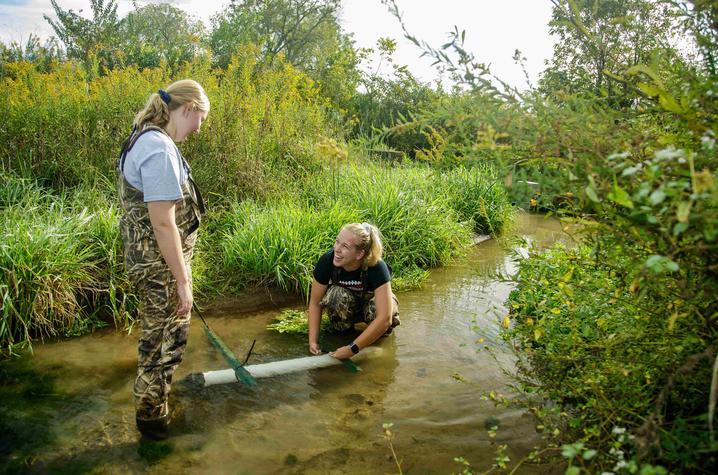UK launches program to address water resources and sustainable engineering challenges in Appalachia

The University of Kentucky Martin-Gatton College of Agriculture, Food and Environment is excited to announce the launch of a new Research Experiences for Undergraduates (REU) program. This opportunity aims to provide undergraduates with invaluable research opportunities focused on engineering solutions for water resource management and sustainability in the Appalachian region.
Titled "Multidisciplinary Approaches for Overcoming Water Resources and Sustainable Engineering Challenges in Appalachian Regions," and supported by a $487,086 award from the National Science Foundation, the groundbreaking program will start next summer.
The REU project, spearheaded by UK Martin-Gatton CAFE, is designed to engage undergraduate students from underrepresented groups in STEM (science, technology, engineering and mathematics) fields.
"We're very excited about this initiative,” said Associate Professor Tiffany Messer, Ph.D., of UK's Department of Biosystems and Agricultural Engineering. “Although we haven't started yet, we're in the planning stages and are looking forward to making a significant impact.”
The program will host 10 students each summer for the next three years, offering them a comprehensive package that includes a stipend, housing, food and research opportunities. The primary objectives of the program are:
- enhancing student research opportunities related to water resources and sustainable engineering, specifically addressing challenges in the Appalachian region;
- advancing inclusivity and diversity by ensuring that at least 60% of participants come from institutions with limited research opportunities, 50% are from underrepresented groups in STEM and 40% are first-generation college students from Appalachia; and
- promoting community engagement by integrating existing student researchers and partnering with local Appalachian communities to provide real-world exposure and practical solutions.
Research focus
The program will focus on two main tracks:
- Environmental and Water Resource Impairments and Solution Challenges: Addressing issues such as flooding, waste management and water quality in Appalachia. Students will explore new ways to manage these challenges, leveraging innovative best management practices like wetlands, biochar and hemp for remediation; and
- Sustainable Engineering Solutions and Economic Feasibility: Investigating sustainable engineering practices and their economic impacts on local communities. This includes exploring new industries, managing agricultural waste and improving infrastructure to support local economies.
Participants will work closely with faculty mentors from UK and partner institutions, engaging in projects that directly benefit Appalachian communities.
"We hope to not only introduce these students to critical regional issues like flooding and waste management but also to potential new industries that could transform the economic landscape of Appalachia,” Messer said. “Through hands-on research, they'll gain invaluable insights into creative solutions specific to the area."
Students can tour various Appalachian sites across Kentucky, interact with community members and present their research findings. This hands-on experience is expected to inspire students to pursue further education and careers in STEM fields, thereby contributing to the diversification and strengthening of the STEM workforce in Appalachia.
The program aims to generate new knowledge and innovative solutions for water resources and sustainability challenges. The project will also advance scientific understanding and provide significant societal benefits by engaging students in multidisciplinary research. Including diverse student cohorts will enhance the program's impact, promoting STEM education and outreach in Appalachian schools.
"The broader impacts of this program extend beyond academic research," Messer said. "By involving students in partnerships for community-focused projects, we're helping to build a stronger, more resilient future for Appalachian regions."
Research reported in this publication was supported by the National Science Foundation under Award Number 2348814. The opinions, findings, and conclusions or recommendations expressed are those of the author(s) and do not necessarily reflect the views of the National Science Foundation.
Credits
Jordan Strickler (Martin-Gatton College of Agriculture, Food and Environment)

